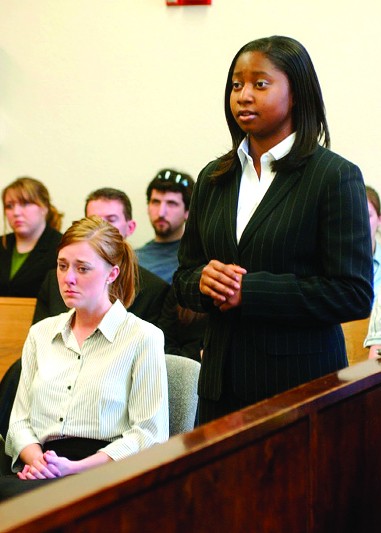DES MOINES, Iowa – On a sunny Sunday afternoon in Iowa’s capital city, senior philosophy major Francis Granados slouched in the dimly lit Skywalk Lounge, slowly drinking two bottles of Bass beer, one for each award he didn’t win at the 21st annual National Intercollegiate Mock Trial Championship Tournament.
To his side were three reminders of the glory he had sought — coaches Aisha Henry, Amir Sadeghy and Milt Theologou, who had each won the national championship and thus been named All-American attorneys while on the Maryland mock trial team between 1996 and 2000.
The scene reflected a sobering reality for the program, tied with Rhodes College as the school with the most wins in the nation, as Maryland has won four national championships in its 16-year history, but none since 2000.
Even with Granados, who scored in the 93rd percentile in his LSAT exam, the program once again fell short of the national championship.
The university’s two teams placed eighth and 12th in their division, a cause for celebration at many universities. But not Maryland. Not when the program had won the national championship four times in nine years, in 1992, 1996, 1998 and 2000.
There wasn’t all bad news yesterday. Tiffani Sterrette and Lauren Pruitt both won All-American attorney honors, and out of the 64 best teams in the country, 32 in each division, the team’s placing is not embarrassing by any means. But this is Maryland mock trial.
“We don’t go to the middle of Iowa on two planes at the butt crack of dawn to lose,” said senior government and politics major Lyle Dresbold, whose propensity for humor overshadows his deep knowledge of the law.
While the Terps expected to win this weekend, so did more teams than ever before. The first national tournament in 1985 was made up of eight teams; this weekend’s competition was composed of 64 of the best 576 teams in the nation, said mock trial director Mark Graber, who is in his first year of guiding the university’s program.
With every Ivy League school now participating as well as the best of the rest (Duke University, Massachusetts Institute of Technology, Stanford University, etc.), the Terps are having difficulty living up to the standards set by Henry, Sadeghy, Theologou and others during the university’s heyday.
“The difference is the talent level of the opposition,” said Graber. “In the ’90s a lot of schools were just starting programs. Now, look, it’s Harvard, it’s Yale, it’s UCLA.” University of California, Los Angeles, one of Maryland’s peer schools, defeated Georgia Tech in the final trial Sunday to win the national championship for the second straight year.
“We were the best program in a small field,” Graber said. “Now we’re an exceptionally good program in a big field.”
What set this university’s program apart from most of the competition this year (the team placed higher than Northwestern University, among others), was the team’s diversity and desire, said Sadeghy, a practicing attorney in Rockville who graduated from the university in 2000.
University mock trial students have been born in India and have vacationed in Haiti. They work as Shuttle-UM bus drivers and as Georgetown law firm assistants. They have been extras on America’s Most Wanted and directors of campaigns for universal health care in Oregon. They spent time in Iowa coaxing team members into the hotel hot tub (they called objection) and spent time on the phone with their pregnant wife back home. University mock trial students are talented and aware.
“I’m entering the tournament confident we’ll come out on top,” Granados said Friday before the tournament. He was one of many students who spoke during the weekend of when they would win the championship, not if. “The University of Maryland is the best mock trial team in the nation,” he said.
Just because the university did not win this year does not necessarily mean Granados was wrong. Even before the results were announced Sunday, everyone, from the founder of collegiate mock trial to the participants, had said the judging of this activity is very unscientific.
“In the real world, judging is subjective,” Graber said. “So that judging is subjective in the mock trial world is not exactly news. At the end of the day, you have to decide did you give your best? And 16 Maryland kids did the best performance they were capable of doing.”
On Saturday night, after six hours of competition trials, the team Granados captained gathered in Theologou’s hotel room to debate strategy for the next day’s trial.
Britt McEachern, a senior government and politics major, asked whether the team should call a different witness, a seemingly normal question until you consider the team has been working on the same case for more than six months. McEachern’s proposal was roundly denounced, but his suggestion is a testament to the team — always thinking, always posturing, always working.
“If you look at people who are truly great at what they do, they’re not normal,” said Sadeghy, who decided to become a lawyer after being sucked in by mock trial’s pull. “It gets to be an obsession.”
Since late September, mock trial members have been debating the fictional case of whether Polk Hospital is liable for damages incurred by Tony Kissner, a star collegiate golfer at Midlands State. Kissner was struck in the neck and shoulder by a tire iron wielded by Martin Dutcher, a former patient at Polk Hospital.
Dutcher was being treated for intermittent explosive disorder. But Kissner clipped the side of Dutcher’s car. But the hospital treated him with clomipramine and monoamine oxidase inhibitors. But it released him despite knowing his disorder was cyclical in nature.
These folks consider all the angles.
Each mock trial team can consist of eight people: three attorneys, three witnesses, one timekeeper and one substitute. A team acts as either the plaintiff or the defense in each trial. In tournaments, two judges separately rate each “play” — opening statement, direct examination, witness testimony and so on, on a scale of one to 10. The side with the most points wins.
But because those points are given out based on a judge’s personal preference, the best team doesn’t always win mock trial.
“In hockey, you know when you won — you scored more goals,” said Pruitt, a December graduate who played on the field hockey team for one season. “In mock trial, you’re in limbo. Even if you do your best, your best might not have been what the judge is looking for.”
So the students practice relentlessly to give the judges little opportunity to snatch points away. The team has been honing its arguments for more than six months.
On Wednesdays during the season, 28 students and five coaches met at 6:30 p.m. for four hours of GVPT 329: Mock Trial II. On every Saturday for two semesters, the group met again, this time at 9 a.m. and in full court attire — business suits for both sexes. The weekend sessions involved running through the trial twice, which took at least six hours.
“Mock trial is hell on your social life,” said Tiffani Sterrette, for whom the time commitment is a particular stress.
A criminology and criminal justice and family studies major who captained one of the university’s teams at nationals, Sterrette lives with her mother and older brother in Baltimore, meaning she has a daily, 90-minute, round-trip commute to the campus. She works up to 20 hours a week at a telecommunications company and has recently been spending 30 to 35 hours a week on mock trial (both teams held meetings outside of Wednesday and Saturday). She also spends time with her goddaughter and not only attends but excels in class — she has been on the dean’s list every semester she has been at the university.
In only her second year of mock trial, Sterrette has emerged as a leader.
“I have more people that are looking at me and looking at my reactions to things,” she said. “I think they’re expecting more from me.”
In spite of her dedication, Sterrette’s team placed 12th in its 32-team division. Meanwhile, the team Granados captained came in eighth.
Given his experience, many of his teammates thought Granados’ squad would capture the national championship — he’s been competing in mock trial events since he was a sophomore in high school. Granados is smart, but his intelligence is not threatening; he’s smarter than you in the way clients take solace in their lawyers being a few steps ahead of them.
Perhaps it was that intellect that attracted Mary Dubay, whom Granados, 21, married last August.
While methodical and forward-thinking in the courtroom, Granados’s personal life has been full of the spontaneous and the unforeseen. He met his wife in May 2001, when she instant messaged him after randomly viewing his AOL profile. The two hit it off and soon after, were married. They are expecting a baby in June.
“We plan to spend our time together and we want to have a family, so no time like the present,” said Granados. “It was definitely unexpected when we found out we were going to have a baby,” he said. “But I’m really happy to be a dad.”
In addition to being a father and husband, Granados will be a law student in the fall at Indiana University. He was given a full scholarship in part because of his success in mock trial — co-captain freshman and sophomore year, captain junior and senior year.
While Granados is the latest star to come out of the university’s mock trial program, he is hardly the first. Numerous trial attorneys have had their start on one of the teams, including Scott Palmer, a 1992 alumnus who served during the Clinton administration on the President’s Initiative on Race.
The practiced lawyers were turned out by longtime mock trial director Dr. Noel Myricks, who founded the university’s program in the early ’90s. Over the years the program has garnered the kind of praise movie critics shower on George Lucas.
Dr. Felicia Walker, director of Howard University’s mock trial program, called this university’s program a “powerhouse.”
“A force to be reckoned with,” raved Middle Tennessee State University educator coach John Vile. “A virtual dynasty.”
Dick Calkins had a gleam in his eyes when he talked about the program. Calkins founded the American Mock Trial Association, the governing body of collegiate mock trial, in 1985. With four championships in its 21-year history, the Terps have nearly taken it hostage. As the activity expanded from eight schools in its first year to more than 300, Calkins subsequently added qualifying national tournaments as well as nearly two dozen regional tournaments.
“It wasn’t too long before I saw it was a good chance to give intellectual students the same opportunities as athletic students, to go around the country and compete,” he said.
Calkins is not misguided when he categorizes mock trial as a sport, said assistant coach Sadeghy, who once played semi-pro baseball and other sports.
“I’ve never experienced anything as draining as a weekend of mock trial,” he said. “It completely consumes you.”
If mock trial is a sport, this university’s team is the Duke men’s basketball team, said Dan Routh, a junior government and politics major who plays an attorney. The team is confident, to the point that members admit they could be construed as cocky. But they are consistently successful, even this year when, like the Blue Devils, some predicted a down year for the program, said Routh.
“We’re one of the most, if not the most respected teams in the country,” said Sadeghy. “We don’t go out there trying to make friends, and we don’t care what they think of us, so yeah, I think we’re hated.”
Not all team members are loathed, however. Before Sunday’s first trial, a scout from a rival school came up to McEachern and complimented him on his convincing performance Saturday as an expert witness.
McEachern had played a professional doctor. His impersonation was not made by but certainly could have been aided by the fact that McEachern is 25 years old.
An admittedly stubborn kid, McEachern said he was a slacker in high school in Greenbrae, Calif., just outside San Francisco. He didn’t have a life goal to chase and as a result, went nowhere.
“I didn’t know what I wanted to do with my life,” he said. “I didn’t have a goal so I didn’t want to do work. Once I had that reason to work, that’s when I put the nose to the grindstone.”
After stints in California and Oregon community colleges, McEachern received his break. Through a connection he had attained by volunteering for a Oregon gubernatorial candidate, the government and politics major was hired with a friend to run a statewide campaign promoting universal health care for an upcoming ballot measure.
“We drove all over the state,” he said. “We were working 100-plus hours a week. It was a wild ride and we ended up getting crushed.”
McEachern said his campaign was outspent $1.5 million to $50,000.
Despite the defeat, McEachern had found his purpose: politics. He enrolled at Maryland soon after and is set to graduate this spring.
On the Drake University campus Sunday, McEachern’s team went against the University of Virginia. If both judges sided with Maryland, the team would be headed for the national championship trial.
McEachern did his best depiction of Dr. D.P. Dehnert, and Granados took the opposing team’s strategy and turned it against them; he’s as deft on his feet as an improvisational comedian. But for all its efforts, a slick UVA team reminded the audience why lawyers are stereotyped as weasels — and ruined any chance Maryland had to win its first national championship in five years.
After the results were announced, Graber huddled his team around him in the atrium of the Polk County Convention Complex in downtown Des Moines. In his first season leading the program, Graber’s senior-laden team had directed the director. As he did Thursday before the tournament began, Graber said thank you.
“I’m so proud of every one of you,” he said. “Yeah, I spent a half-hour being depressed. You’re all welcome to a little bit. When you’re done being depressed, be extremely proud of yourselves.”
One of the two Maryland teams at the mock trial championships huddle before their meet to chant their team mantra, “Finish it.”
Lauren Pruitt, 2004 graduate, presents her opening statement as the acting attorney for her defendant (seated behind).





